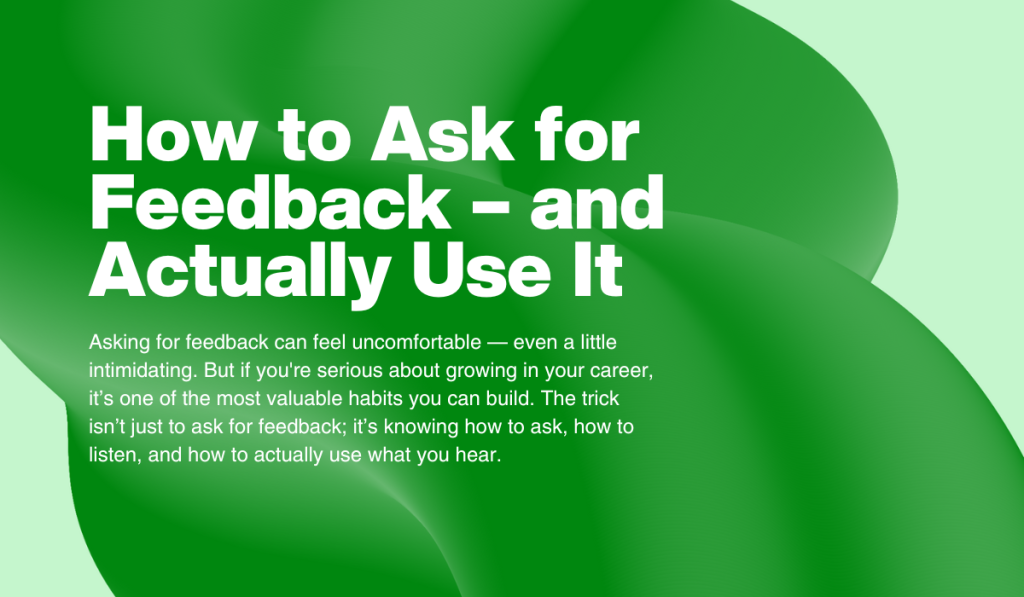Asking for feedback can feel uncomfortable — even a little intimidating. But if you’re serious about growing in your career, it’s one of the most valuable habits you can build. The trick isn’t just to ask for feedback; it’s knowing how to ask, how to listen, and how to actually use what you hear.
Here’s a straightforward guide to getting better feedback — and making the most of it.

1. Be Clear About What You Want
The best feedback starts with a good question. Instead of asking, “Do you have any feedback for me?” (which often leads to vague or polite answers), get specific.
Try something like:
- “Is there one thing I could improve on for next time?”
- “How could I make this report/meeting/presentation stronger?”
- “What’s one skill you think I should focus on developing?”
Specific questions invite specific answers — and that’s where real growth happens.
2. Pick the Right Time
Timing matters. Right after a big project, a presentation, or a milestone is a great moment to ask for feedback. People’s impressions are still fresh, and you’re showing that you care about improving while the experience is still relevant.
If possible, give your manager or colleague a little notice. A simple, “I’d love to get your feedback after the meeting,” helps them prepare their thoughts — and you’ll likely get more thoughtful responses.
3. Listen Without Defensiveness
This is the hardest part — and the most important. When someone points out something you could do better, your first instinct might be to explain yourself or push back. Try not to.
Instead, focus on listening. Take notes if it helps. Even if you disagree with part of the feedback, thank the person for their honesty. You don’t have to agree with everything, but being open shows maturity and professionalism.
Remember: feedback is a tool for growth, not a personal attack.
4. Ask Clarifying Questions
If a piece of feedback feels unclear or a bit general (“You could be more organised”), don’t be afraid to ask for examples or suggestions.
You might say:
- “Could you give me an example of when that happened?”
- “What would being ‘more organised’ look like in my day-to-day work?”
Clarifying helps you understand the feedback fully — and gives you actionable steps to work on.
5. Look for Patterns
One-off comments are helpful, but patterns are even more powerful. If you hear similar feedback from different people, or across different projects, pay attention. That’s a strong signal that it’s an area worth focusing on.
Patterns also help you avoid overreacting to isolated feedback that might not be a big deal in the bigger picture.
6. Turn Feedback Into Action
The whole point of asking for feedback is to use it. After you’ve gathered input, identify 1–2 specific things you want to work on. Set small, realistic goals around them.
For example: if you heard that your presentations need more structure, your next step could be practising with an outline in advance, or if you heard that you should speak up more in meetings, you might aim to contribute at least once per team discussion.
Small changes, consistently made, add up over time.
7. Follow Up
Showing that you took feedback seriously can leave a great impression. After working on a suggestion, check back in:
- “I’ve been focusing on organising my reports more clearly – have you noticed a difference?”
- “Thanks again for your advice on leading meetings. I tried your approach last week, and it worked really well.”
This not only shows growth — it builds stronger, more supportive professional relationships.
Your Next Step Toward Growth
Feedback isn’t about being perfect; it’s about learning, adjusting, and growing over time. When you get into the habit of asking for feedback, listening without defensiveness, and using it to make small improvements, you’ll stand out — and you’ll keep moving forward in your career.
It’s not always easy to hear where you can do better. But the willingness to ask, listen, and act is what sets great professionals apart from good ones.



